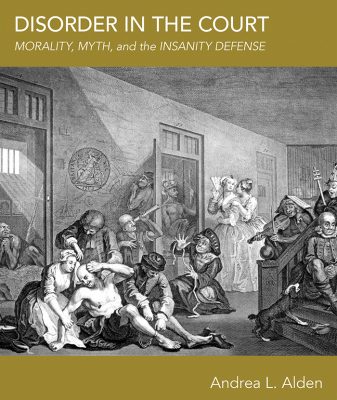By Theresa Smith
GCU News Bureau
In August, Dr. Andrea Alden, an assistant professor of English in the College of Humanities and Social Sciences, published her first book, "Disorder in the Court: Morality, Myth, and the Insanity Defense." To order the book, click here.

In a behind-the-scenes peek at the writing of the book, GCU Today peppered Alden with questions about her first single-author book project:
How long did it take to research and write the book?
It feels like a really long time, and it has been almost a decade from start to finish. I started the project in 2010 when I was a Ph.D. student; it eventually became my doctoral dissertation, which I completed and defended in October of 2013. I was introduced to the editor of the Rhetoric, Law, and Humanities book series with the University of Alabama Press, Dr. Clarke Rountree, by a colleague who thought he might be interested in the manuscript.
He asked for a formal proposal, which I spent three months drafting (it was five pages long, but I wanted it to be perfect). My proposal did the trick, and I was offered an advance contract in early 2015. I delivered the first draft of the revised manuscript in July of 2016, got my anonymous reviewer feedback in September, revised again, and delivered the final version in June of 2017. The last year was spent on the copy editing and indexing process, and it was finally in print this summer!

Have you attended any trials in which the insanity defense was used?
I have never attended one, but I spent several years reading about the case studies in the book (which range from the 1700s to the 1980s), and I stay up-to-date on any relevant news stories.
What drew your interest to the trial of John Hinckley Jr.?
The Hinckley trial is the last case study in the book because his was the last trial that resulted in any significant reforms (or attempted reforms) of the legal standards for insanity, and it is the only case I wrote about that took place in my lifetime or in which the defendant is still living.
What is the most controversial aspect of the insanity defense?
The insanity defense is the most controversial subject in criminal law, and it is not very well understood, which adds to its complexity. Both the public and professionals within the criminal justice system subscribe to several pervasive myths about mental illness, about people who suffer from it, and about the insanity defense and what it means. This is one of the major barriers to sensible reform.
The main argument I make in the book is that the legal understanding of mental illness and its effect on criminal culpability bears no resemblance to the medical and psychiatric understanding of diagnosing and treating mental illness, particularly in light of advances in neuroscience and neuropsychiatry. The criminal justice system is not at all equipped to address the myriad variables that factor into mental illness or its relationship to criminality.
When and how did your interests in law and psychiatry intersect, leading to this book?
I have always been interested in institutional discourse, both the law and medicine, specifically, as someone who studies language and power, the ways in which people talk about criminal responsibility and mental illness. The insanity defense epitomizes the complexities that arise when two competing sets of institutional discourse collide with conflicting goals.
Contact Theresa Smith at (602) 639-7457 or [email protected].



































































